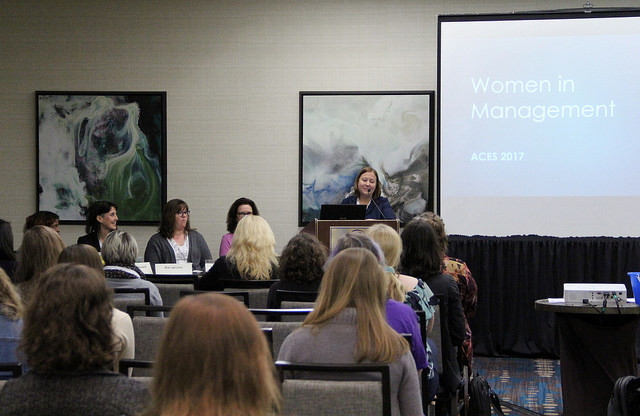
Over 15 years ago, a few ACES members got together, asked themselves some questions, and realized women in leadership and management positions, while rocking the business world, were lacking something.
That something was a space where they could talk about their ideas, experiences, and strategies for avoiding common pitfalls. Thus, the “Women in Management” session was born.
This year, the forum was led by Sara Ziegler, editor at Law360 and the treasurer of ACES; Kat Jercich, managing editor at Rewire; Maisha Maurant, manager of the Communication and Creative Services team, and chief corporate editor at Health Alliance Plan of Michigan; Melissa McCoy, founding member and former vice president of ACES; and Courtney Rukan, the deputy multiplatform editing chief at The Washington Post.
Whether managing people, processes, or projects, they said there were a few rules to follow in order to be successful. Some of these rules are as follows:
According to McCoy, when you manage a group, everyone has a different skill set. A successful manager takes note of individuals’ strengths and uses that knowledge when assigning tasks. If someone is a faster reader than designer, she’ll use that team member to fly through the stories. If someone else is a whiz with design, then she’ll tap into that person’s expertise.
As a manager, it is very important to acknowledge who did what. A manager should not take credit for someone else’s work, nor let anyone take credit for hers. If one of the employees did something brilliant, they should be given credit. If the manager proposed a great idea, she should own it. The same is true for the less pleasant stuff.
“Don’t take bullets that aren’t yours to take,” said Rukan. “I had a boss that said I wasn’t going anywhere until I stopped taking bullets.”
A successful manager should reward her staff for excellent work. This could be accomplished in various forms. She can shoot them an email, praise an employee in their next one-on-one interaction, give a shout out at the next meeting, or she could mention the good work to her superior.
“Find out how people like to be recognized,” said Maurant.
A manager could reward her team for a job well done with a dinner, movie outing, gift certificate, or time off. The important thing is to benchmark success. According to Ziegler, the team’s success is the manager’s success.
“If you promote them, your boss will remember you put them in a place to succeed,” said Rukan. The team’s win is the manager’s win.
Also, the manager should be sure to sing her own praise as well. This could be done by noting it down in a log or annual review, bringing it up in the next team meeting when sharing highlights and wins of the team, or in a one-on-one conversation with one’s boss.
“If your boss doesn’t set [the one-on-one] up, then ask for it,” said Maurant.
While the forum leaders expanded on this point in reference to addressing an issue with an employee, it is a statement that symbolizes the rest of the ideas discussed. Ultimately, a manager sets the boundaries in the workplace. She needs to make herself heard, and she needs to be firm.
In the case of addressing a problem with a team member’s work, she needs to keep a few things in mind. For example, a critique should be about the employee’s work, not their character. Also, the manager should offer the critique in private. McCoy stressed the importance of calling it a “critique,” because it is not about blaming the person, but helping them get better.
According to Maurant, she experienced an instance when she was critiquing a company memo, and the writer took the comment personally. They insisted she was saying they didn’t know how to do their job. Maurant made it clear that wasn’t the message, and brought the discussion back to the work that was the issue. In such a case, she suggests to “stay factual,” say things like “we are working on this together,” and ask questions as if you were the end user.
“Don’t soften yourself. It undermines your authority,” Ziegler said.
The session concluded, rushed to a close due to time constraints. Even though it ended on the schedule, it sparked a bigger conversation. This is why it is a recurring session. The issues are still around, but now those who attended know there is a running dialogue about many of the issues they face at work as women.
As for the future of the session, McCoy and Maurant hope for more time, and to possibly split the forum between two sessions.
Cristina E. Garcia is the office manager at Miami Industrial Motors Inc. Previously, she worked at Florida International University's newspaper as the production manager and copy chief. She has a passion for news, books, and social justice. If you'd like to connect, follow her on Twitter: @BookishCristina.